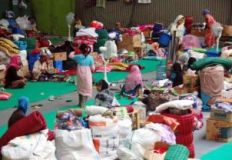(Ahlul Bayt News Agency) - “We have met with local clerics in Madura and based on discussions with them, they are willing to accept the refugees because they are interrelated,” Suryadharma told reporters after meeting the displaced Shiites at the shelter on Wednesday evening.
Among those who attended the meeting were several officials from the East Java provincial administration, including the rector of Surabaya’s Sunan Ampel State Institute of Islamic Studies (IAIN), Abdul A’la.
However one cleric insisted that the Shiites must convert first.
“Residents and clerics in Madura insist that Tajul Muluk’s Shia followers must return to the teachings of Ahlussunnah Wal-Jamaah, and then we will accept them again in Sampang,” said the cleric in Sampang, referring to the leader of the Shia community.
The cleric requested anonymity because of the huge pressure to resolve the case. He also claimed that the minister’s statement was a result of heavy international pressure on President Susilo Bambang Yudhoyono to solve the problem.
In a closed-door meeting at the Grahadi Building in Surabaya on Aug. 1, Yudhoyono expressed his disappointment at the Sampang incident, which had become an international issue, whereas in fact the case was much less significant than previous riots in places such as Poso or Ambon. Yudhoyono, however, asked that the case not be treated lightly as the world was closely following the case.
The demand for Tajul Muluk’s followers to convert, said the cleric, was nonnegotiable. In several meetings with the administration, clerics and the police the community in Madura had expressed their wish for reconciliation provided the Shia followers “repented”.
“Now, 12 families have repented and they have returned peacefully to their village in Sampang. Actually, many of Tajul Muluk’s followers, who do not follow his teachings seriously, wish to return home,” he said.
Of the 200 Shiites in the refugee camp, he claimed, only one third of them remained deeply committed but they were very influential in the group, while the rest just went along and joined the group due to economic hardship.
Shia refugee Imam Ansori, 45, said he refused to change faith despite having often been urged to do so by local clerics.
“We refuse to change our faith despite living in a shelter for who knows how long,” said Ansori, who lives with both parents, his wife and three children in a 5-by-6 meter room in the shelter at the Puspa Agro Market complex.
The same stance was expressed by another refugee Rubaah, 42, who also lives at the shelter with his wife and two children. He said the calls to convert had actually been made by the local administration and clerics for a long time.
“We have been asked to sign a letter of repentance, failing which we will not get protection. We’ve refused because matters regarding religion are not in the hands of the local administration,” he said.
Currently, the conditions for the 200 Shia refugees who have been staying at the Puspa Agro Market in Sidoarjo since June 20, are little better than those that they endured when they were taking refuge at the Sampang Sports Complex in Madura, despite the fact that they were promised a decent standard of living at the shelter.
They were relocated from the Sampang Sports Complex — where they had been staying since Dec. 30, 2012 — to the Puspa Agro Market after they were evicted by clerics in Sampang.
They were driven out of their village after an incident in which four homes, a small mosque and an elementary school at the Tajul Muluk Islamic boarding school complex in Nangkernang hamlet, in Sampang, were razed to the ground by an anti-Shia mob on Dec. 29, 2012.
/106

